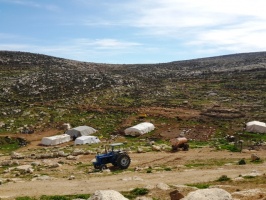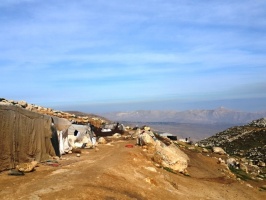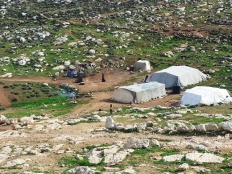- About
- News
-
Advocacy
- Accountability & Litigation
- International Advocacy
- National Advocacy
- Documentation
- FAI Unit
- Al-Haq Publications
- Library


- About
- News
-
Advocacy
- Accountability & Litigation
- International Advocacy
- National Advocacy
- Documentation
- FAI Unit
- Al-Haq Publications
- Library
 Throughout 2015, Israel demolished 232 Palestinian-owned properties in the Occupied Palestinian Territory (OPT), including houses, animal sheds, and water wells,[1] for lacking licenses. This has resulted in the displacement of 628 people, including 342 children. An additional 16 homes were punitively demolished in 2015.
Throughout 2015, Israel demolished 232 Palestinian-owned properties in the Occupied Palestinian Territory (OPT), including houses, animal sheds, and water wells,[1] for lacking licenses. This has resulted in the displacement of 628 people, including 342 children. An additional 16 homes were punitively demolished in 2015.
Most recently, on 2 February 2016, the Israeli Civil Administration (ICA) demolished at least 20 structures in the Jinba and Halawa areas of Masafer Yatta. Additionally, 5 solar panels were confiscated from the area. Israel had previously closed Masafer Yatta, declaring it a firing zone for training, and hence putting tens of families at risk of forcible eviction, demolition and displacement.
'Ain Al-Rashash Bedouin Community - Nablus
On 28 January 2016, the Bedouin community of 'Ain Al-Rashash, southeast Nablus, was informed that the Israeli High Court had issued an order to evacuate them from the area within the following seven days, alleging that it is a military training area.
There are approximately 25 residential and animal structures in ‘Ain Al-Rashash wherein 10 families, including 44 children, reside. The residents have lived in that location since 1985; during the summers, the community moves approximately 200 metres and returns in the winter. The community is not provided with any services or basic infrastructure, including a water network, electricity, a health clinic, or a school.
In 2009, the ICA distributed stop construction orders among all residents of the community. The community hired a lawyer to follow up on the case. On 30 November 2015, the ICA distributed stop construction orders to the same community again. As of now, the 92 residents of the community are threatened to lose their homes and be forcibly transferred.
Jerusalem
 On 27 January 2016, Israeli authorities demolished two Palestinian-owned houses in Occupied Jerusalem claiming that they lack building licenses. That morning, members of the Israeli Special Unit entered Shu'fat with bulldozers and surrounded the residence of Kifaya Muhammad Al-Risheq wherein 18 people reside, including 12 children. The municipality had issued a demolition order for the house in December 2015. The IOF then broke into the house and forcibly and violently evacuated its residents. The house had first received a demolition order in 2001. The family appointed a lawyer in an attempt to issue a license for the house. Since 2001, the family had paid 75,000 shekels (approximately USD 18,900) in fines, excluding the lawyer's cost.
On 27 January 2016, Israeli authorities demolished two Palestinian-owned houses in Occupied Jerusalem claiming that they lack building licenses. That morning, members of the Israeli Special Unit entered Shu'fat with bulldozers and surrounded the residence of Kifaya Muhammad Al-Risheq wherein 18 people reside, including 12 children. The municipality had issued a demolition order for the house in December 2015. The IOF then broke into the house and forcibly and violently evacuated its residents. The house had first received a demolition order in 2001. The family appointed a lawyer in an attempt to issue a license for the house. Since 2001, the family had paid 75,000 shekels (approximately USD 18,900) in fines, excluding the lawyer's cost.
The Israeli municipality claimed that the house was built on "Green Land" and accordingly construction is prohibited. For two years now, and in the same area, the Israeli authorities have been constructing a road to connect settlers in the French Hill to the settlement of Atarot. This has also threatened seven additional houses in the vicinity that have already received demolition orders from the ICA.
Moreover, Ibrahim Ali Surri's house which was still being constructed was demolished in Jabal Al-Mukabber without prior notice. The owner was supposed to move into the house with his wife and six children within weeks, however, he received a stop construction order in December 2015. Israeli authorities prohibit residents of Jabal Al-Mukabber from expanding on the surrounding empty lands claiming that it is "green land".
 Palestinians continue to be subject to the constant and imminent threat of house demolitions as well as forcible transfer and eviction due to Israel's discriminatory building policies in East Jerusalem and Area C. Palestinians are rarely granted building permits. Yet with the natural need to expand due to population growth, they either build without a license or relocate outside of East Jerusalem and Area C, risking huge losses either way. Israel continues to ignore its obligations set forth under international humanitarian law which prohibit the destruction of property unless for absolute military necessity and the forcible transfer of the protected population. Both constitute grave breaches of the Geneva Conventions and war crimes under the Rome Statute of the International Criminal Court. The displacement and forcible transfer of Palestinians also impacts numerous human rights, including the denial of the right to an adequate standard of living, housing, and access and sovereignty over natural resources, amongst other rights.
Palestinians continue to be subject to the constant and imminent threat of house demolitions as well as forcible transfer and eviction due to Israel's discriminatory building policies in East Jerusalem and Area C. Palestinians are rarely granted building permits. Yet with the natural need to expand due to population growth, they either build without a license or relocate outside of East Jerusalem and Area C, risking huge losses either way. Israel continues to ignore its obligations set forth under international humanitarian law which prohibit the destruction of property unless for absolute military necessity and the forcible transfer of the protected population. Both constitute grave breaches of the Geneva Conventions and war crimes under the Rome Statute of the International Criminal Court. The displacement and forcible transfer of Palestinians also impacts numerous human rights, including the denial of the right to an adequate standard of living, housing, and access and sovereignty over natural resources, amongst other rights.
